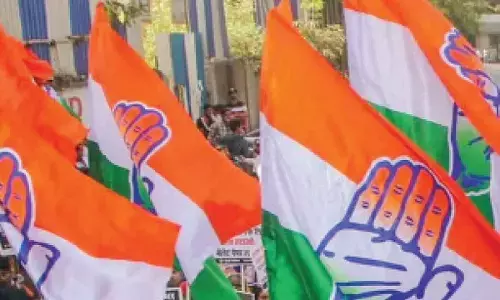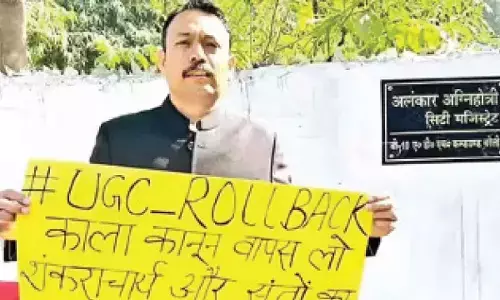Antithesis of freedom of speech & expression

Antithesis of freedom of speech & expression
Sedition is not a ground for ‘reasonable restriction’ on freedom of speech and expression guaranteed under Article 19(1)(a) of our Constitution
Sedition is not a ground for 'reasonable restriction' on freedom of speech and expression guaranteed under Article 19(1)(a) of our Constitution. It cannot stay on in Indian Penal Code.
During debates in the Constituent Assembly on April 29, 1947, while discussing the Interim Report on Fundamental Rights, Somnath Lahiri feared that restriction proposed would have the effect of taking away everything that was guaranteed. He strongly challenged the need for the breadth of the restriction on free speech based on sedition.
He wanted that the word 'sedition' be deleted from the sentence "Provision may be made by law to make the publication or utterances of seditious, obscene, blasphemous, slanderous, libellous or defamatory matter actionable or punishable." He said: ……. these are fundamental rights from a police constable's point of view and not from the point of view of a free and fighting nation. Here whatever right is given is taken away by a proviso.
Does Sardar Patel want even more powers than the British Government – an alien Government, an autocratic Government which is against the people – needs to protect itself? Certainly not. …. here we find that none of the existing provisions of the powers of the executive has been done away with; rather in some respects those powers are sought to be increased. And if some of the amendments are passed – especially that of Shri Rajagopalachariar – it will in certain cases be even worse than the conditions obtaining at present. I will give one example. Here according to Sardar Patel, a seditious speech is a punishable crime. If I say at any time in the future, or the Socialist Party says, that the Government in power is despicable, Sardar Patel, if he is in power at that time, will be able to put the Socialist Party people and myself in jail, though, as far as I know, even in England a speech, however seditious it may be, is never considered a crime unless an overt act is done. These are the fundamental bases of the fundamental rights of a free country, but here a seditious speech also is going to be an offence; and Shri Rajagopalachariar wants to go further. Sardar Patel would punish us if we make a speech, but Rajaji would punish us even before we have made the speech. He wants to prevent the making of the speech itself if in his great wisdom he thinks that the fellow is going to make a seditious speech."
Draft Constitution retained 'sedition'
But the draft Constitution of 1948 retained sedition as one of the restrictions on free speech and expression. On December 1, 1948, Damodar Swarup Seth said: "Indeed, Sir, the guarantee of freedom of speech and expression which has been given in this article, is actually not to affect the operation of any existing law of prevent the State from making any law relating to libel, slander, defamation, sedition and other matters which offend the decency or morality of the State or undermine the authority or foundation of the State. It is therefore clear, Sir, that the rights guaranteed in article 13 are cancelled by that very section and placed at the mercy or the high-handedness of the legislature. These guarantees are also cancelled, Sir, when it is stated that, to safeguard against the offences relating to decency and morality and the undermining of the authority or foundation of the State, the existing law shall operate.
It is therefore clear that under the Draft Constitution we will not have any greater freedom of the press than we enjoyed under the cursed foreign regime and citizens will have no means of getting a sedition law invalidated, however flagrantly such a law may violate their civil rights.
Law of Sedition, the Official Secrets Act and many other laws of a repressive character will remain intact just as they are. If full civil liberties subject to Police Powers, are to be allowed to the people of this country, all laws of a repressive character including the Law of Sedition will have either to go or to be altered radically and part of the Official Secrets Act will also have to go.
Then K M Munshi proposed a sentence justifying restrictions on various grounds but not on 'sedition'. Munshi said: "I was pointing out that the word 'sedition' has been a word of varying import and has created considerable doubt in the minds of not only the members of this House but of Courts of law all over the world. Its definition has been very simple and given so far back as 1868." It says, "Sedition embraces all those practices whether by word or deed or writing which are calculated to disturb the tranquillity of the State and lead ignorant persons to subvert the Government."
Sardar Hukum Singh raised an objection against retaining other matters like "libel, slander, defamation and sedition, all of them" in Article 13 (previous form of present Article 19) saying: in article 13(1), sub-clauses (a), (b) and (c), they give constitutional protection to the individual against the coercive power of the State, if they stood by themselves. But sub-clause (2) to (6) of article 13 would appear to take away the very soul out of these protective clauses.
Hukum Singh pointed how even the Supreme Court is restricted. He said: "…any legislation restricting these liberties can be enacted "in the interest of the general public". Now who is to judge whether any measure adopted or legislation enacted is "in the interest of the general public" or "in the interest of public order", or whether it relates to "any matter which undermines the authority or foundation of the State?"
All that the Supreme Court shall have to adjudicate upon would be whether the law enacted relates to "sedition" and if it does, the judiciary would be bound to come to a finding that it is valid. It would not be for the Judge to probe into the matter whether the actual provisions are oppressive and unjust. If the restriction is allowed to remain as it is contemplated in 13(2), then the citizens will have no chance of getting any law relating to sedition declared invalid, how so ever oppressive it might be in restricting and negating the freedom promised in 13(1)(a).
After the amendments suggested by KM Munshi, the language of Article 19(2) has excluded the word sedition, but the core intent based on the judgements delivered on Section 124A of the IPC until then was engrafted in the limitations on free speech by replacing the word sedition with the words "which undermines the security of, or tends to overthrow, the State."
British Indian Federal Court in Niharendu Dutt Majumdar Vs King, (in III and IV Federal Court Reports) has made a distinction between what 'Sedition' meant when the Indian Penal Code was enacted, and 'Sedition' as understood in 1942. The Chief Justice of India in that case said: "This (sedition) is not made an offence in order to minister to the wounded vanity of Governments but because where Government and the law ceases to be obeyed because no respect is felt any longer for them, only anarchy can follow. Public disorder, or the reasonable anticipation or likelihood of public disorder is thus the gist of the offence. The acts or words complained of must either incite to disorder or must be such as to satisfy reasonable men that that is their intention or tendency."
The government and the courts validated and retained these restrictions. Various judgements explained the criterion and ingredients of 'sedition' but refused to remove it from IPC, though many countries including UK abolished that crime long back. Not just the 'sedition,' the civil society and judiciary should raise voice against UAPA and other draconian laws that undermine the Constitutional guarantee to fundamental rights.
(The author is Professor & Dean of School of Law, Mahindra University, Hyderabad, formerly Central Information Commissioner)

















